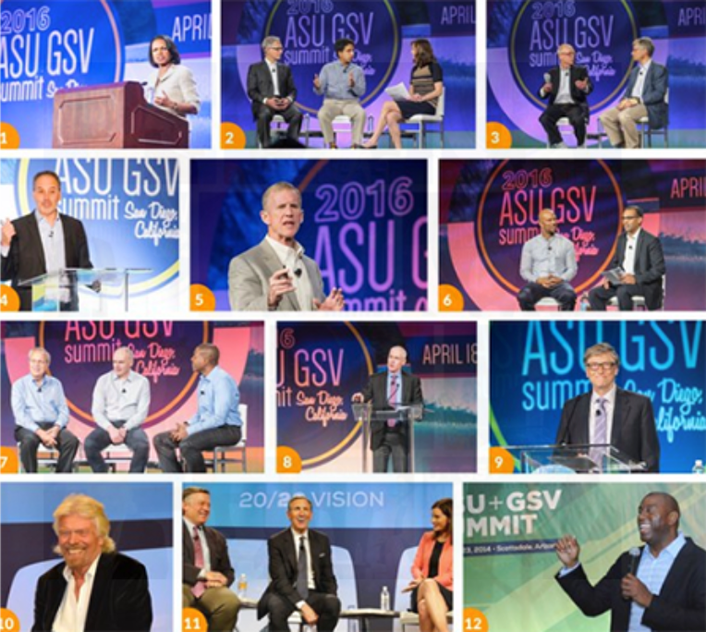
If there's one place to find the world's movers and shakers at the intersection of education and business — specifically, the edtech business — it's the annual ASU/GSV conference.
Energy and excitement regularly permeate the hallways, sessions and after-hours events; after all, it's here that the most promising edtech entrepreneurs gather each year to mix and mingle with powerful investors, corporate sponsors and wealthy foundations (not to mention the many tech-inspired educators).
With globally-recognized keynote speakers (http://asugsvsummit.com/2016-speakers/)— this year's event featured Bill Gates, Condoleezza Rice, Jim Collins, Guy Kawasaki, and Sal Khan, among many other academic, public sector and business luminaries — it's no surprise that the organizers regularly attract diverse audiences and have witnessed impressive annual growth.
There is more to this than the top billing, who are impressive in their own right. Though the scent of investment is very strong at this gig, much of the deal-making and whiz-bang technology demonstration has at least an element of social purpose and educational mission behind it.
EDUCAUSE staff members in attendance last month felt that this year's event — the first time it was held at a larger facility in San Diego instead of in Phoenix — moved to a new level of buzz and urgency. This was partly due to GSV's efforts, some of which were grant-supported, in order to enable the participation of a broad range of practitioners. This included many school district leaders on the K-12 side via a partnership with national education nonprofit Digital Promise.
The inclusive nature of the conference also promoted a team-based approach to solving educational challenges. Margita Blattner, Chief Corporate Strategy and Business Development Officer, felt that the organizers had successfully created an 'integrated collaborative community' that was respectful of the many stakeholder groups in attendance.
There was more than a quiet acknowledgement of this inclusive approach; Blattner added that panelists and thought leaders — some of whom hailed from academia, others from business — emphasized the fact that higher education and K-12 simply cannot innovate by themselves, in silos separated from each other, and without strong participation from other sectors. External partners in the form of emerging and growth edtech, as well as educational consulting and strategy firms, clearly have made themselves an integral part of the ongoing process of reimagining the future of both education sectors.
Andy Calkins, Deputy Director for Next Generation Learning Challenges (NGLC), an initiative of EDUCAUSE, led an immersive workshop titled High Velocity Design: A Next Gen Learning SuperLab. The workshop, which he co-facilitated with Getting Smart CEO Tom Vander Ark, featured 16 NGLC grantees who are part of a national cohort of pioneering schools designed entirely around principles of next gen learning: student-centered, personalized, competency-based, experiential, and focused on richer/deeper definitions of student success.
Since its inception late in 2010, NGLC has invested more than $65 million in a range of "building block" innovations and whole-school and college degree-program models designed by educators to create more personalized learning and substantially improved outcomes for students. These grants have catalyzed many new models in postsecondary education, including SNHU's College for America and Northern Arizona's Division of Personalized Learning, and a variety of K-12 models as well, as evidenced in both charter schools and public school redesigns from across the country such as Summit, Design Tech, Brooklyn LAB, Cornerstone, MATCH Next, Matchbook Learning, USC Hybrid High, and Horry County Public Schools.
Al Motley was one 2016 speaker whose significant experience from both the academic and technical perspectives added further context to the edtech contingent. As Chief Technology Officer of charter school company Matchbook Learning, Motley has personally led the development of Spark, an edtech platform that integrates tools into an ecosystem for students, teachers, parents and administrators. He represented one of a number of NGLC grantees (both K-12 and postsecondary) participating in the event.
Attendees planned their itineraries based on interest tracks as wide-ranging as K-12 Program, the Future of Work, and Growth and Venture Company Tracks. "The fizzy intersection of professionals from all sides of education, the public and private sector is the best thing about ASU/GSV, and the reason it's growing in popularity," Calkins said. "When you put higher ed and K-12 educators and tech innovators in a room with new startups, successful post start-ups and investors and stir it up, a lot can happen."
If ASU/GSV 2016 had an underlying theme, it would be around the imperative of innovation.
- How can we design more effective methods, models and technologies that will scale, ultimately increasing access and student success?
- How can educators push the boundaries within their own institutions, and how can entrepreneurs collaborate with them to better understand their target audiences?
- What will be the next big disruption in K-12 or higher education? Will it come from technology — or something else?
These are, of course, the multimillion dollar questions many are seeking to answer. One thing we can count on: those capable of resolving them were, in all likelihood, represented at ASU/GSV.
Kristi DePaul of Founders Marketing provides editorial support and regular contributions to the Transforming Higher Ed column of EDUCAUSE Review on issues of teaching, learning, and edtech.
